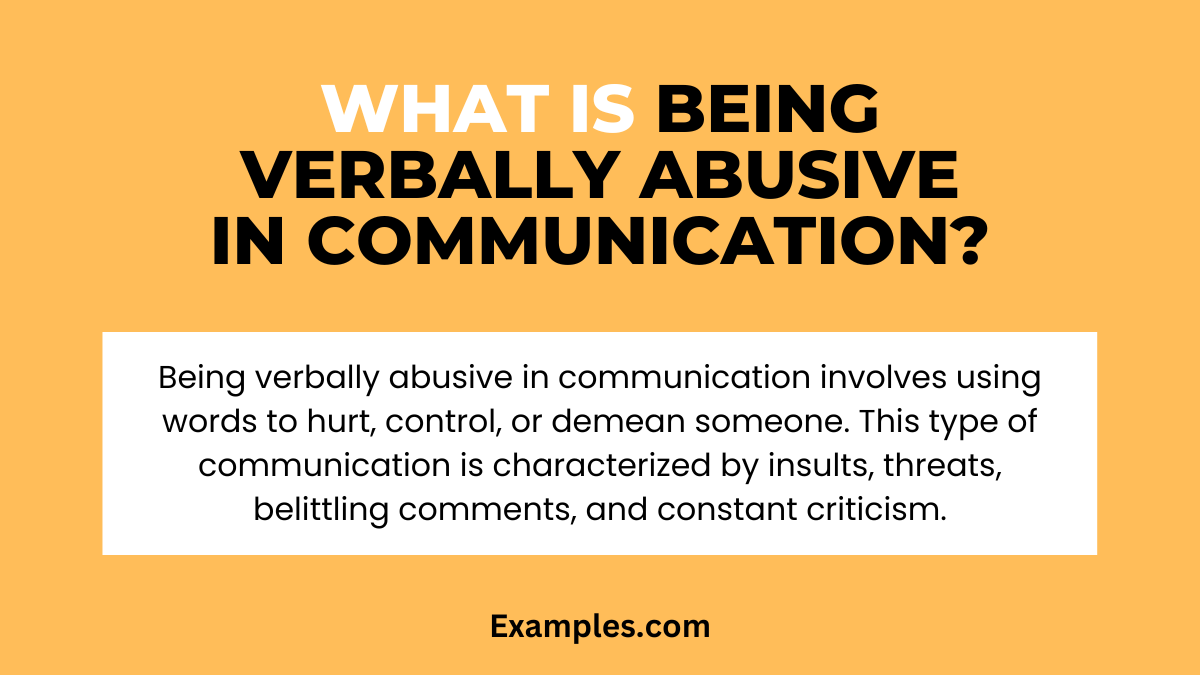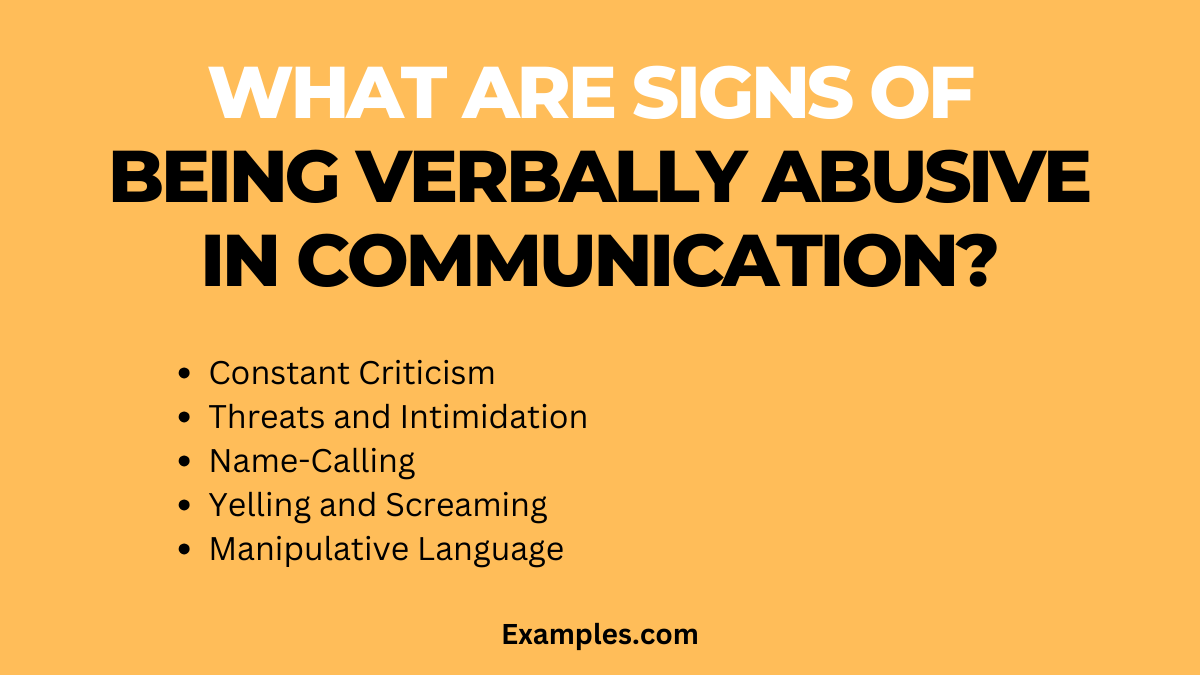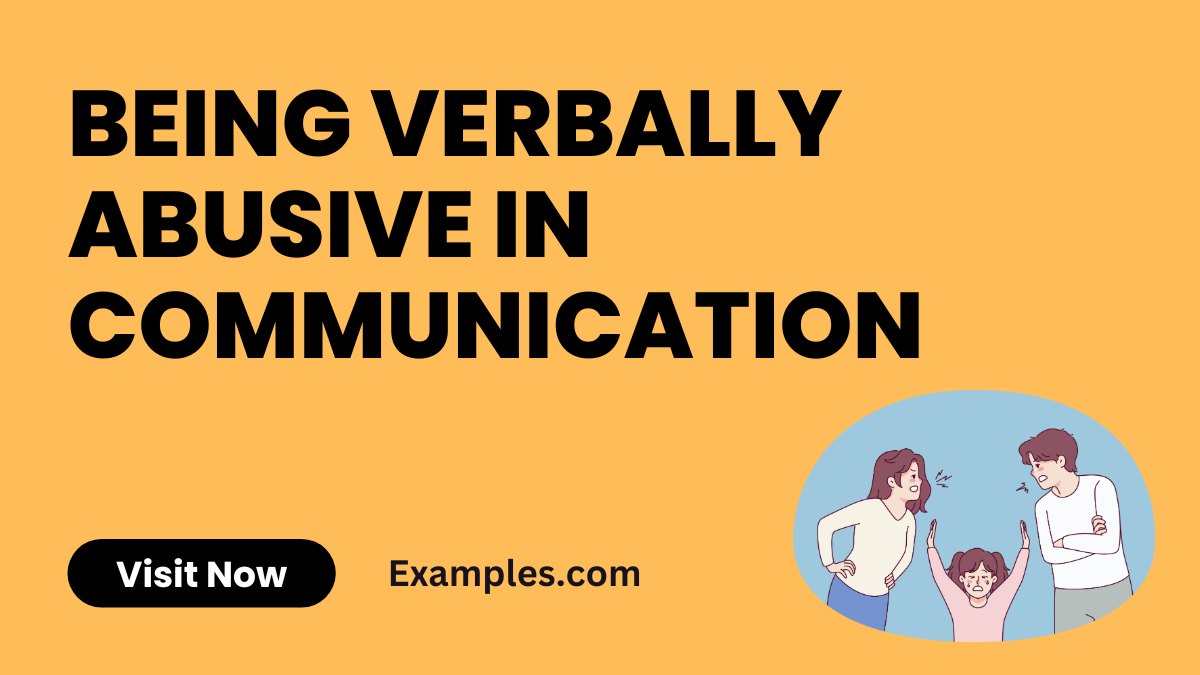Being Verbally Abusive in Communication
“Being Verbally Abusive in Communication” presents a comprehensive exploration of the harsh realities and impacts of aggressive language. This guide delves into various communication examples, illustrating how verbal abuse manifests in different contexts. It provides insights into recognizing verbal abuse, understanding its detrimental effects, and learning strategies for dealing with such communication effectively. The article serves as an essential resource for anyone seeking to navigate and address the challenges of verbally abusive interactions, whether in personal relationships, the workplace, or other social settings.
What is Being Verbally Abusive in Communication?

Being verbally abusive in communication involves using words to hurt, control, or demean someone. This type of communication is characterized by insults, threats, belittling comments, and constant criticism. It goes beyond just being harsh or direct; it’s a form of aggression that can cause significant emotional harm to the recipient. Verbally abusive communication is damaging to relationships and can create a toxic environment, whether in personal interactions or in the workplace.
20 Being Verbally Abusive in Communication Examples
Being verbally abusive in communication is a destructive behavior that undermines respect and trust. It includes using words to belittle, intimidate, or threaten another person, often leaving lasting emotional scars. This type of communication is characterized by hostility and aggression, and it can manifest in various contexts, from personal relationships to professional environments. Here are 20 examples, each with an explanation:
- “You’re so stupid, you can’t do anything right!” – This statement is demeaning and attacks the person’s intelligence and capabilities.
- “I can’t believe how useless you are.” – A direct insult to someone’s abilities, intended to make them feel worthless.
- “If you had a brain, you’d be dangerous.” – Sarcastic and offensive, this remark belittles the person’s intelligence.
- “You’re a total failure as a manager.” – A personal attack on professional competence, damaging the individual’s confidence.
- “You’re just a lazy, good-for-nothing slob.” – Insults the person’s character and work ethic.
- “Nobody likes you because you’re so annoying.” – Aims to isolate the person socially by attacking their personality.
- “You’re such a coward, always running away from problems.” – Accuses the person of lacking courage, aimed to shame them.
- “Oh, crying again? What a baby.” – Mocks the person’s emotions, showing a lack of empathy.
- “You’re the reason this project failed.” – Blames the person entirely, disregarding other factors.
- “Stop acting like a martyr; you’re just seeking attention.” – Invalidates the person’s feelings or struggles.
- “You’ll never amount to anything.” – A crushing statement aimed at destroying someone’s self-esteem.
- “You’re a disgrace to this team.” – Publicly shames the person in a professional setting.
- “Just shut up, you don’t know what you’re talking about.” – Dismisses the person’s opinions or thoughts rudely.
- “You’re the worst mistake I ever made.” – Expresses deep regret in a hurtful manner.
- “You call this work? My dog could do better.” – Ridicules the person’s efforts or work quality.
- “No wonder everyone talks behind your back.” – Implies social exclusion and gossip.
- “You’re such a disappointment.” – Expresses disapproval in a deeply personal way.
- “Why can’t you be more like your sister?” – Compares the person unfavorably to others.
- “I don’t know why I waste my time with you.” – Implies the person is unworthy of attention.
- “You’re a joke; no one takes you seriously.” – Undermines the person’s self-worth and credibility.
Examples of Being Verbally Abusive Communication in a Relationship
Verbally abusive communication in a relationship can deeply harm the emotional well-being and trust between partners. It often involves hurtful words, manipulative language, and derogatory remarks. Recognizing these patterns is crucial for addressing and preventing emotional harm in relationships. This section provides examples of such communication, highlighting the importance of respectful and caring interactions in maintaining healthy relationships.
- “You’re worthless and will never amount to anything.” – This statement belittles and devalues the partner’s self-worth.
- “No one else will ever love you like I do.” – Manipulative language that aims to isolate the partner.
- “You’re just too sensitive; it’s always about you!” – Dismisses the partner’s feelings and deflects accountability.
- “You always ruin everything!” – Generalizes and blames the partner for negative outcomes.
- “If you leave me, you’ll regret it.” – Uses threats to control the partner’s actions.
What are the Signs of Being Verbally Abusive in Communication?

Signs of verbal abuse in communication include:
- Constant Criticism: This involves persistently finding fault or focusing negatively on someone’s actions or character, which can erode self-esteem and confidence.
- Threats and Intimidation: Using language to create fear or exert control. This can range from subtle threats to overt intimidation, impacting the victim’s sense of safety and autonomy.
- Name-Calling: Employing derogatory labels or hurtful names to demean and belittle someone. This form of verbal abuse can have a lasting emotional impact.
- Yelling and Screaming: Raising the voice aggressively can be a form of verbal abuse, creating an environment of fear and tension.
- Manipulative Language: This involves using words to coerce, control, or subtly influence someone’s decisions or actions. It can be particularly damaging as it often undermines the victim’s autonomy and decision-making power, leading to confusion and self-doubt
These types of verbal abuse, each damaging in its own way, highlight the need for awareness and intervention to foster healthier and more respectful communication in all relationships. Recognizing these signs is important for addressing and preventing verbal abuse.
What are the Effects of Being Verbally Abusive in Communication?
The effects of verbal abuse in communication are significant:
- Emotional Trauma: It can lead to deep psychological scars, impacting mental and emotional stability over time.
- Damaged Self-Esteem: Constant verbal abuse undermines self-confidence, leading to feelings of worthlessness and insecurity.
- Anxiety and Depression: Exposure to verbal abuse can trigger or exacerbate anxiety and depression, affecting mental health.
- Relationship Strain: Such communication erodes trust and understanding, leading to conflicts and dysfunction in relationships.
- Social Withdrawal: Victims may isolate themselves, finding it challenging to trust new people or form healthy relationships.
Understanding these effects is crucial for fostering healthy communication environments.
Types of Verbally Abusive Communication
Verbal abuse in communication can manifest in various forms, each causing significant emotional impact:
- Name-Calling: This involves using hurtful, offensive labels or terms that demean a person’s identity or worth. It’s a direct attack on someone’s character.
- Gaslighting: A manipulative tactic where the abuser makes the victim doubt their own memories or perceptions, often leading to confusion and loss of self-esteem.
- Constant Criticism: This form of verbal abuse is characterized by relentless negative remarks and fault-finding, which can significantly damage a person’s self-confidence.
- Threatening Language: Using language to create fear or intimidate, such as threats of harm or loss, it’s a way to exert control and power over someone.
- Blame Shifting: The abuser avoids accountability by consistently blaming the victim for their own actions or for problems in the relationship.
Understanding these types of verbal abuse is crucial for recognizing and addressing them effectively.
What to Do About Being Verbally Abused?
Here are the actions to be taken for Being Verbally Abused:
- Recognize the Abuse: It’s crucial to acknowledge and understand that the negative treatment you’re experiencing is indeed verbal abuse. This recognition is the first step in addressing the issue.
- Set Boundaries: Communicate firmly and clearly to the abuser that their behavior is unacceptable. Setting these boundaries is essential for your self-respect and mental well-being.
- Maintain Safety: Always prioritize your emotional and physical safety. If you feel threatened, take necessary precautions to protect yourself.
- Document the Abuse: Keep a record of abusive incidents, including dates, times, and what was said. This documentation can be crucial for any future legal or therapeutic measures.
- Consider Professional Help: Engaging with a professional counselor or therapist can provide you with coping strategies and help in dealing with the impact of the abuse.
- Evaluate the Relationship: Honestly assess whether the relationship is healthy and consider if it’s sustainable or beneficial for your well-being.
- Legal Action: In cases of severe abuse, legal action or obtaining a restraining order might be necessary steps to ensure your safety and well-being.
How to Deal with Verbally Abusive Communication?
Here are the ways to Deal with Verbally Abusive Communication:
- Stay Calm: Maintaining your composure is crucial. Reacting emotionally can escalate the situation. Staying calm helps you think more clearly and respond more effectively.
- Don’t Retaliate: Avoid responding with similar abusive language. Retaliation can worsen the situation and is unlikely to resolve the underlying issue.
- Assertive Communication: Respond assertively but respectfully. Express clearly how the abusive communication affects you and firmly state that such behavior is unacceptable.
- Seek External Help: In a professional setting, don’t hesitate to report the abuse to HR or a supervisor. Seeking help is important for addressing the issue and protecting yourself.
- Self-Care: Prioritize your emotional well-being. Engage in activities that help you relax and maintain a positive mindset.
- Develop Coping Strategies: Techniques like deep breathing, stepping away from the situation, or speaking to a trusted friend can help manage your emotional response.
- Educate Yourself: Learning more about verbal abuse, its impact, and strategies to deal with it can empower you to handle such situations more effectively.
In conclusion, being verbally abusive in communication is not only harmful but also counterproductive. It creates a hostile environment, damaging relationships and trust. Such behavior, characterized by aggression and hostility, can lead to lasting psychological impacts on both the recipient and the perpetrator. It is crucial to recognize and address this toxic communication style to foster healthier, more respectful interactions in all aspects of life, be it personal or professional.



